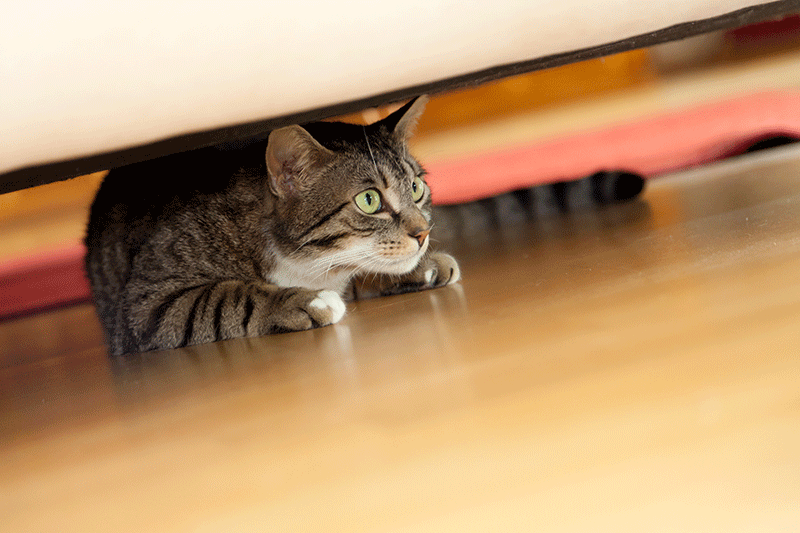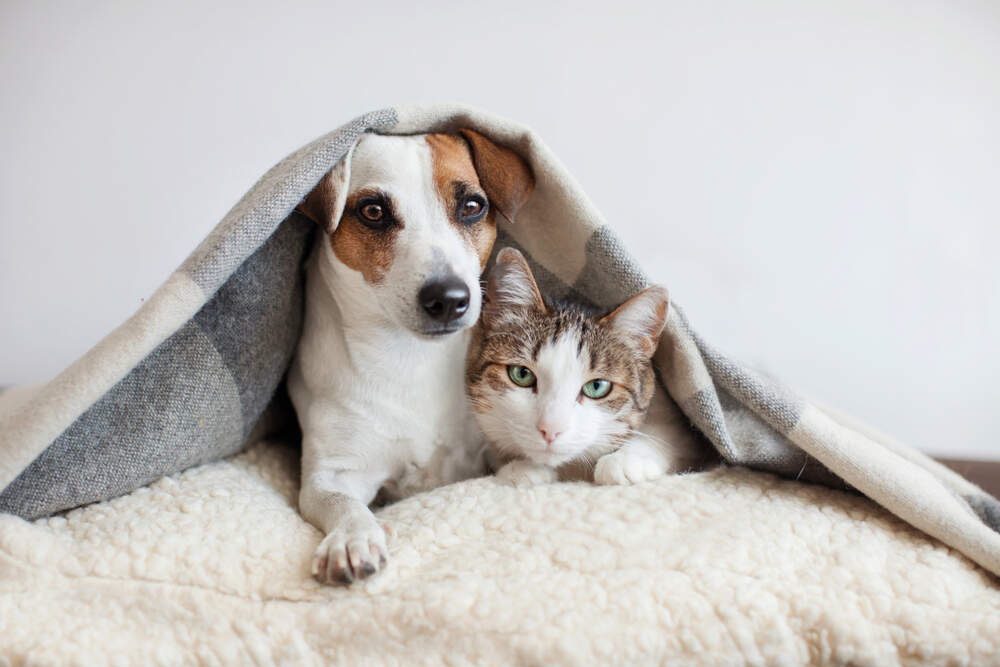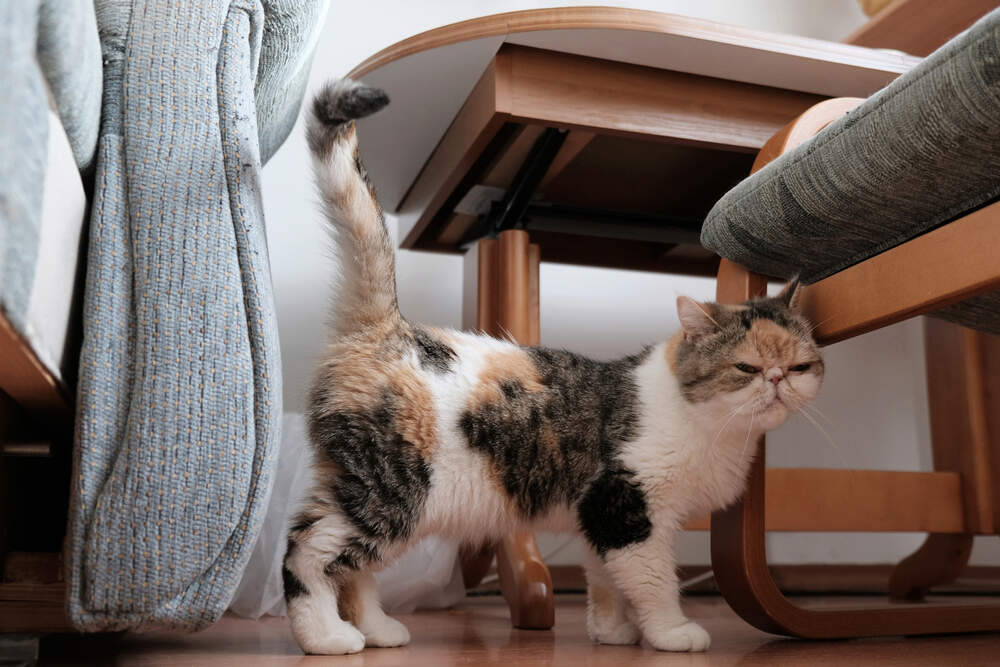Cat Stress Symptoms and Relief
Whether you're getting a new piece of furniture, going on a vacation, or having family over to visit, a little change of scenery can be just what you need. But from your cat's point of view, these traditionally "fun" activities can bring new stress. And that stress can lead to destructive behaviors as cats try to adjust to the change. Here's how you can help your cat navigate unexpected changes and deal with all that stress successfully.
Symptoms Your Cat Is Stressed
Cats often show they are stressed by engaging in destructive behaviors.
Scratching up the wall or carpet can be a sign of stress. Spraying and urinating outside the litter box are traditional stress symptoms for cats, even after they've been neutered or spayed.
A howling cat that meows excessively may be a sign of stress, as can eating less or sleeping more. Excessive grooming and scratching can be stress-induced.
If your cat is acting mean to other animals or even people, it can mean a cat feels insecure. Some cats do the opposite of all these things; rather than becoming destructive, they isolate and hide.
In short, a big personality change or destructive habits might indicate stress. However, you should see a veterinarian if your cat is recently acting differently, as a medical reason might also be the cause.
Causes of Stress in Cats
In addition to an undiagnosed medical issue, other life changes can stress out your cat. Consider the following changes to your cat's environment.
1. Visitors
Your cat likes to feel in control of her environment and loves a routine. Visitors bring increased noise and activity, unfamiliar smells, curious children, and maybe even other animals, all of which can cause your cat stress.
2. A New Family Member or Pet
A new cat or dog or even a new baby can cause your cat stress. All of these require him to change his routine, and that can be tough.
3. Outside Stressors
The stress doesn't have to come from inside the home. Outside influences, like loud noises or stray cats, can be enough to stress out your cat.
4. Traveling
Traveling short distances (like to the vet) or long distances (road trip!) are all the same to your cat. Some cats may even just get stressed at the sight of a carrier.
5. Moving or Getting New Furniture
Moving to a new home will understandably cause stress. But did you know that simply getting a new piece of furniture or changing your furniture's location might be enough to stress out a cat?
6. Unexpected Stress with Another Pet
A pet doesn't have to be new to cause stress. If an unexpected noise scares your cat and another dog or cat was around at the time, your cat might transfer that fear onto your other pet. You might need to "reintroduce" pets that suddenly start fighting for no apparent reason.
7. A Change in Routine
A change in routine might also stress out your cat. For example, if you changed shifts at work, just being at home during different hours might cause your cat some insecurity.
8. Something else
If your cat's displaying stress behaviors and none of these sources are the cause, think of something else that might have changed in the home. Is there another reason your kitty might be feeling a little insecure?
How to Help Your Cat Feel Less Stressed
You can do several things to help your cat feel less stressed.
1. Provide Hiding Spaces
Help your cat feel less stressed when guests come over. Let your cat hide away in an area separate from visitors until she's ready to emerge, so she can approach when it's comfortable for her.
2. Use Calming Diffusers
The Comfort Zone Calming Diffuser dispenses a drug-free, odorless vapor that mimics a cat's natural calming pheromones, signaling that the area is friendly and safe. Use the diffuser in the areas that may have stress triggers so your cat feels more relaxed.
3. Play Nicely and Manage Interactions
Give your visitors your cat's favorite toy so they can interact in a fun way. Teach children to be gentle while petting, and not to bother your cat while she's sleeping or eating.
You can minimize the stress of a visiting animal by keeping the two pets in separate parts of the house and not allowing the visiting pet to have access to your cat's litter box and food and water bowls.
If you're introducing a new cat or dog that will be living in your home, introduce them slowly. Start by keeping them in separate rooms and feeding them on either side of a closed door.
4. Decrease Stressful Sounds and Sights Outside
Cats can pick up on their owner's stress, so, if possible, try not to show that you're feeling stressed about your cat's actions. You can diminish some triggers by closing the blinds at night so your cat won't see feral cats outside. If your cat likes a specific noise, like the TV or music, then play it when there's a sound that might stress your cat, like the lawn mower.
5. Give Your Cat More Items for His "Territory"
Cats are territorial and need items they can call their own in order to feel more confident. Set up cat trees, cat condos, window perches, and beds your cat can "claim" as his.
6. Play With Your Cat More
Engage your cat's mind more frequently. Cats may be stressed if they have too much pent-up energy. Get out a feather wand toy and encourage your cat to chase you around the house. Try clicker training. You can even set up an escape-free, enclosed cat tent outside and take your kitty out there every day to engage her mind more.
Stressed cats can make everyone in the home feel stressed. By finding the source of the stress and helping your cat deal with it in a healthy way, you can leave everyone feeling happier, including your fur baby.




